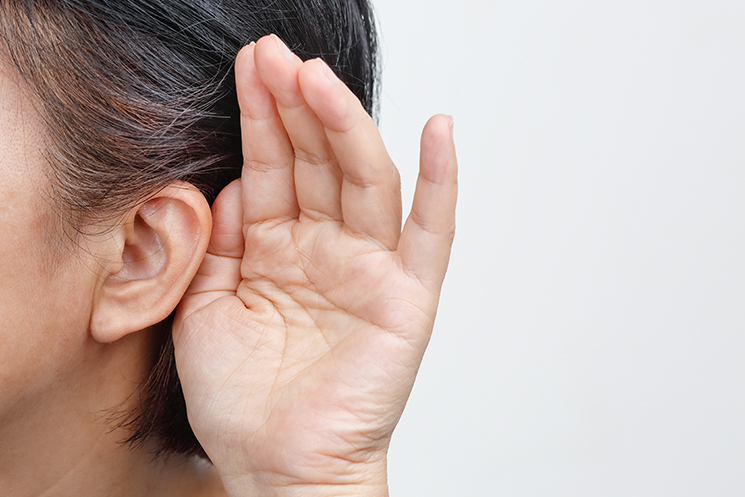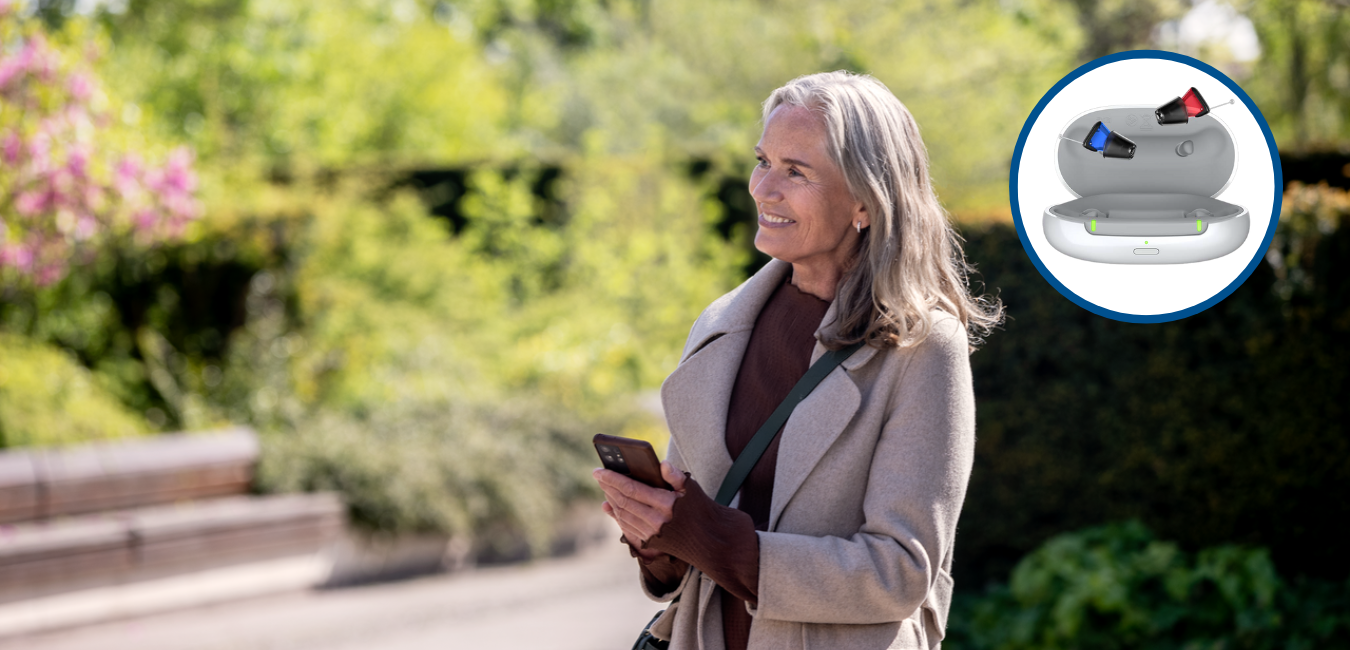Better Hearing Month: What Are the Effects of Hearing Loss?
Did you know that over 1.5 billion people live with hearing loss worldwide? According to the World Health Organization, this number could rise exponentially to 2.5 billion by 2050. Hearing loss means an individual cannot hear the baseline standard of 20dB of sound or more bilaterally.
When we think of people experiencing hearing loss, we often think of a person who is entirely deaf and unable to hear at all. However, the reality of hearing loss is more complex; it can range from mild to severe, affecting one ear or both. It also stems from various causes, including but not limited to infection, advanced age, noise, illness, medication, and genetics.
Regardless of the cause or severity of hearing loss, the effects can impact one’s life in many ways beyond simply missing a few words in the conversation now and again. It affects communication, development, social skills, academics, occupation, mood, health, and even relationships.
Hearing Loss in Seniors and Older Adults
Presbycusis, or age-related hearing loss, is the progressive loss of hearing that occurs as people age. It is a bilateral condition that affects both ears and can worsen with time. It begins with the loss of high-pitch sounds and can progress to affect lower pitches as well.
This is a common symptom associated with ageing, though the degree can vary significantly from person to person.
Typically, age-related hearing loss stems from changes to the cochlear hair cells that facilitate the communication of sounds heard by the ear and processed by the brain. As they naturally degenerate with age, as does the ability to hear correctly, resulting in what’s known as sensorineural hearing loss.
Hearing loss in the senior population has various impacts on their everyday lives. Some of the most prevalent include:
Safety
Did you know that the inner ear plays a vital role in balance? Sound cues travel through the ear. They transmit to the brain for processing and can be interrupted by hearing loss.
This interruption interferes with the cognitive ability to multitask, often resulting in the decreased ability to walk safely. Hearing loss can lead to falls and hospitalization, or the opposite, lack of mobility and reduced social exposure.
Social Isolation
While reduced ambulation can physically limit outings, hearing loss can lead to social isolation. Hearing loss makes it difficult to hear and comprehend conversations with loved ones and peers in social settings.
This experience can be mentally taxing, reducing the enjoyment of the outing itself. It leads to declining participation in family gatherings, hobbies, romantic and platonic relationship maintenance, and public outings.
Withdrawn behaviour can lead to isolation, feelings of loneliness and depression and poor mental health.
Dementia
An area currently being studied is the link between hearing loss and dementia. Studies show that hearing loss leads to an increased risk of dementia– the greater the loss, the greater the risk.
Whether it is due to the impact on cognition, social interaction, or otherwise, the risk is still prevalent but somewhat preventable!
Diabetes
Another chronic disease that commonly affects the older population is diabetes. An estimated third of those 65 and older suffer from diabetes and experience signs and symptoms ranging from mild to severe.
Did you know that uncontrolled diabetes can lead to hearing impairment and loss? Sustained elevated blood sugar levels can cause extensive damage to the inner ear’s nerves. In turn, the damaged vessels fail to properly signal the brain, resulting in hearing loss. Those living with diabetes are at double the risk of suffering from hearing loss when compared to healthy adults of the same age bracket.
It is believed that those with elevated blood sugars causing the condition of prediabetes are 30% more at risk of sustaining hearing loss when compared to those with normal levels. Diabetes is a complex condition and should be taken seriously.
You should ensure your medical team keeps watch for potential neuropathies that can affect end organs, hands, feet, eyes, and even your ears.
Tinnitus
Another condition that can affect your hearing and lead to hearing loss is known as Tinnitus. This condition leads those who suffer perceiving a ringing sound or other noises (buzzing, clicking, hissing, humming, roaring, etc.) in one or both ears. The perceived sound is not an external noise but rather a subjective sound that stems from inside the ear, and those around you cannot hear it.
It is a common condition affecting up to 20% of people in the older population. The most common cause of Tinnitus is an underlying condition– this can stem from injury to the ear, issues with circulation, or age-related hearing loss.
With hearing loss, if the small hairs in your cochlea (inner ear) involved in sound wave reception become broken or bent, they can relay incidental electrical signals to your brain, resulting in Tinnitus.
The best way to treat Tinnitus is to treat the underlying condition. That means if hearing loss is the cause, it’s time to find a solution.
Hearing devices have shown marked improvements in assisting seniors with their hearing loss and, in turn, quality of life.
Hearing Loss in Young and Middle-Aged Adults
An often overlooked population when it comes to hearing loss is adults, both young adults and middle-aged. As children and, at times, as seniors, we are cared for and often have our appointments booked to ensure we get our teeth cleaned, our eyes checked, and our health evaluated– but who is looking out for the young and middle-aged adults, if not themselves?
The years between 20-60 are often go-go-go with scholastic, occupational, and familial endeavours leaving little time for self-care. Without regular checkups, many adults may not even realize they are suffering from some ailment or another–including hearing loss.
When it comes to hearing loss, it’s suspected that by age 20, 20% of people already have some degree of hearing loss. While injury, illness, congenital issues, and others can be the root cause of this loss, often it is from prolonged or extraordinary noise exposure. Endured loud sound exposure can lead to hair cell damage in the cochlea, resulting in hearing loss.
During this phase of life, prevention is key to avoiding permanent hearing loss. Wearing appropriate ear protection when exposed to loud noises such as power tools, small machinery, and music can go a long way.
Regularly checking your ears allows you to establish a baseline and assess for any current, unperceived loss.
Hearing Loss in Children
Our youngest members of society experience the world in a display of sights, sounds, smells, tactile sensations, and tastes. Children learn to categorize the world around them from infancy to toddlerhood. They discover how to say and contextually apply them from various sources such as parental speech, reading books, radio, television, and music.
While this is a natural development, it is not the same for a child who has hearing loss. Even mild hearing loss in children can cause them to mishear and, in turn, mispronounce sounds and words.
If undetected and unaddressed, missed sounds can lead to delayed speech, academic challenges and behavioural issues. Fortunately, having your child undergo a hearing assessment and implementing hearing solutions such as hearing aids or assistive devices can significantly impact your child’s life.
Hearing Assessment and Solutions
May is Better Hearing and Speech Month. In recognition, Hearing Solutions is dedicated to raising awareness about how we can assist you or a loved one in improving your hearing. With multiple locations across Ontario, Hearing Solutions offers free hearing tests and complete hearing assessments.
Our expert hearing healthcare specialists will combine their skills with innovative technology to determine the degree of hearing loss and its cause. Whether it’s from loud noise exposure, congenital concerns, illness, or ageing–our team will provide a list of solutions that are right for you.
We offer an extensive catalogue of hearing devices such as hearing aids, assisted listening devices like phones and clocks, in-house cleaning, maintenance tools, replacement parts, custom ear plugs, and sound advice to improve your hearing and quality of life.
Whether you’re concerned about your hearing or wish to establish a hearing baseline, we encourage you to reach out to our team of experienced audiologists for a hearing screening today.
You can book online at Hearing Solutions or call one of our friendly customer service representatives at 1-888-811-9799.
Resources:
ASHA (n.d.). Effects of Hearing Loss on Development. American Speech-Language-Hearing Association. Retrieved April 11, 2023, from https://www.asha.org/public/hearing/effects-of-hearing-loss-on-development
British Columbia Government (n.d.). Age-Related Hearing Loss. HealthLinkBC. Retrieved April 11, 2023, from https://www.healthlinkbc.ca/more/aging-well/age-related-hearing-loss
CDC (2022, May 27). Diabetes & Hearing Loss. Centers for Disease Control and Prevention. Retrieved April 18, 2023, from https://www.cdc.gov/diabetes/managing/diabetes-hearing-loss.html#:~:text=Diabetes%20can%20also%20cause%20nerve,can%20lead%20to%20hearing%20loss.
Mayo Clinic (2022, November 30). Tinnitus. Mayo Clinic. Retrieved April 18, 2023, from https://www.mayoclinic.org/diseases-conditions/tinnitus/symptoms-causes/syc-20350156#:~:text=%22Ninety%20percent%20of%20those%20with,ear%20are%20really%20delicate%20structures.
NBC (2017, February 7). Hearing Loss at 20? CDC Says it’s More Common Than You Think. NBC News. Retrieved April 18, 2023, from https://www.nbcnews.com/health/health-news/hearing-loss-20-cdc-says-it-s-more-common-you-n717921
Ontario Government (n.d.). Infant Hearing Program. Ontario.ca. Retrieved April 11, 2023, from https://www.ontario.ca/page/infant-hearing-program
WHO (2023, February 27). Deafness and Hearing Loss. World Health Organization. Retrieved April 11, 2023, from https://www.who.int/news-room/fact-sheets/detail/deafness-and-hearing-loss







